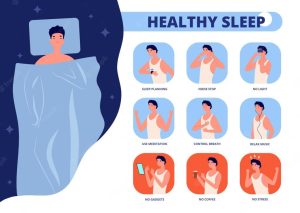Understanding the Importance of Healthy Sleep Habits There is Healthy Sleep Habits for Better Rest In today’s fast-paced world, where stress and distractions abound, ensuring a good night’s sleep can often feel like an elusive dream. However, establishing and maintaining healthy sleep habits is crucial for overall well-being and vitality. In this comprehensive guide, we
Understanding the Importance of Healthy Sleep Habits
There is Healthy Sleep Habits for Better Rest In today’s fast-paced world, where stress and distractions abound, ensuring a good night’s sleep can often feel like an elusive dream. However, establishing and maintaining healthy sleep habits is crucial for overall well-being and vitality. In this comprehensive guide, we delve into the significance of healthy sleep habits and provide actionable tips to transform your nights from moments of fatigue to experiences of fulfillment. Explore More About Other Health Problems And Their Solutions (Nutrition Tips For Balanced Eating)
The Link Between Sleep and Health
Exploring the Relationship
Quality sleep is intricately linked to various aspects of physical, mental, and emotional health. Research has consistently shown that inadequate sleep can lead to a myriad of health issues, including:
- Physical Health Concerns: Insufficient sleep has been associated with an increased risk of obesity, heart disease, diabetes, and compromised immune function.
- Mental Well-being: Sleep plays a crucial role in cognitive function, memory consolidation, and emotional regulation. Poor sleep quality has been linked to depression, anxiety, and decreased overall mental well-being.
- Performance and Productivity: Sleep deprivation can impair decision-making, problem-solving abilities, and overall productivity. It also increases the likelihood of accidents and errors in various domains, including the workplace and while driving.
Understanding Sleep Cycles
To optimize sleep quality, it’s essential to understand the intricacies of sleep cycles. Sleep consists of multiple cycles, each comprising distinct stages:
- NREM (Non-Rapid Eye Movement) Sleep: This stage encompasses light sleep (Stage 1) and deep sleep (Stages 2-3). NREM sleep is essential for physical restoration, growth, and repair.
- REM (Rapid Eye Movement) Sleep: REM sleep is characterized by rapid eye movements and vivid dreaming. It plays a crucial role in memory consolidation, emotional processing, and cognitive function.
Achieving a balance between NREM and REM sleep is vital for waking up feeling refreshed and rejuvenated.

Image by: yendex.com
Establishing Healthy Sleep Habits
Creating a Sleep-Conducive Environment
- Optimize Your Bedroom: Make your bedroom a sanctuary for sleep by keeping it cool, dark, and quiet. Invest in a comfortable mattress and pillows that support proper spinal alignment.
- Limit Electronic Devices: Minimize exposure to screens (phones, tablets, computers, TVs) before bedtime, as the blue light emitted can disrupt melatonin production and hinder sleep onset.
Following a Consistent Sleep Schedule
- Stick to a Routine: Aim to go to bed and wake up at the same time every day, even on weekends. Consistency helps regulate your body’s internal clock and promotes better sleep quality.
- Avoid Napping: While short naps can be beneficial, especially for combating daytime fatigue, avoid long or irregular naps, as they can interfere with nighttime sleep patterns.
Prioritizing Relaxation and Stress Management
- Practice Relaxation Techniques: Incorporate relaxation techniques such as deep breathing, meditation, or progressive muscle relaxation into your bedtime routine to signal to your body that it’s time to unwind.
- Manage Stress Effectively: Identify and address sources of stress in your life through techniques such as journaling, engaging in hobbies, or seeking support from loved ones or a therapist.
Embracing Healthy Sleep Habits for Enhanced Well-being
prioritizing Healthy Sleep Habits for Better Rest is paramount for achieving optimal health, vitality, and overall well-being. By understanding the importance of quality sleep, establishing a conducive sleep environment, adhering to a consistent sleep schedule, and prioritizing relaxation and stress management, you can transform your nights from moments of fatigue to experiences of fulfillment. Remember, adopting these habits may take time and patience, but the long-term benefits are undoubtedly worth the effort. Here’s to better sleep and a brighter tomorrow!

Image by: yendex.com
| Aspect | Healthy Sleep Habits for Better Rest | Inadequate Sleep |
| Physical Health | Reduced risk of obesity, heart disease, diabetes, and strengthened immune function | Increased risk of obesity, heart disease, diabetes, and compromised immune function |
| Mental Well-being | Enhanced cognitive function, memory consolidation, and emotional regulation | Impaired cognitive function, memory consolidation, and emotional regulation, increased risk of depression and anxiety |
| Performance & Productivity | Improved decision-making, problem-solving abilities, and overall productivity | Decreased performance, increased likelihood of accidents and errors |
| Sleep Environment | Cool, dark, and quiet bedroom conducive to restful sleep | Disruptive environment with excessive noise, light, or discomfort |
| Sleep Schedule | Consistent bedtime and wake-up times for better regulation of internal clock | Irregular sleep patterns leading to disruptions in sleep-wake cycle |
| Relaxation & Stress Management | Utilization of relaxation techniques to unwind before bed | Elevated stress levels impacting sleep quality and duration |
FAQS
How do you maintain enough rest and sleep?
Be consistent. Go to bed at the same time each night and get up at the same time each morning, including on the weekends. Make sure your bedroom is quiet, dark, relaxing, and at a comfortable temperature. Remove electronic devices, such as TVs, computers, and smart phones, from the bedroom.
Is struggling to sleep work stress?
According to the AASM, job stress can be a cause of adjustment insomnia. This involves disturbed sleep or sleeplessness that may last for a few days or a few weeks. Other symptoms may include anxiety, worry and tension.
Can overworking cause sleep problems?
Overworking can make you sick the way that burnout can cause health problems — and there are several physical symptoms of overworking. Here are seven common symptoms of overwork: Sleep disorders like insomnia or overall poor sleep patterns.
















